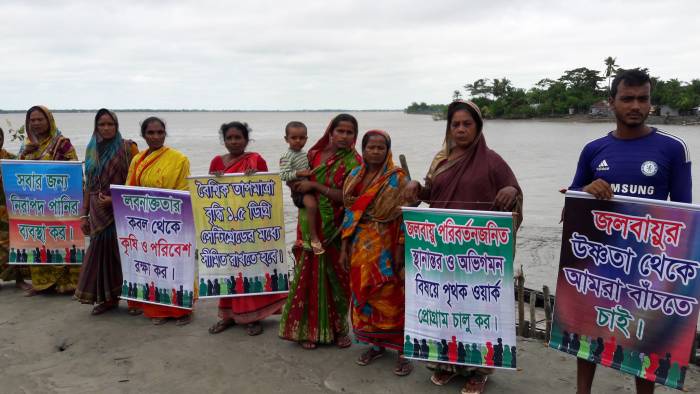On November 10th 2018 protests are taking place in many cities around the world including London, Berlin, Amsterdam, Paris, Toronto, Calgary and Dhaka
If built the Rampal power station in Bangladesh will spew 8 million tonnes of Co2 emissions into the atmosphere contributing to rising temperatures and irreversible climate change.
Campaigners have published an alternative plan for power generation that demonstrates there is no need to take disastrous path of coal mining and coal power plants to meet power demand in Bangladesh. The plan outlines how cheaper, environment friendly and sustainable solutions are possible for Bangladesh.
“There are many alternatives for power generation but there is no alternative for the Sundarban. We urge the governments of Bangladesh and India to cancel all commercial projects including Rampal power plant to protect Sundarban that is the biggest safeguard for people in the region to fight climate change.” Debasish Sarker, NCBD (National Committee to Protect Oil Gas Mineral, Resources Power and Ports, Bangladesh)
Currently Bangladesh produces very little of its electricity from coal and whilst many other countries in the world are looking to transitioning away from coal, the Bangladesh government is planning to massively expand energy production through coal. A slew of mega projects are planned with backing from Chinese, Japanese and Indian banks and contractors.

Bangladesh has a huge abundance of natural resources such as sun and wind, the potential for renewable energy is enormous. As of 2017 over 30 million people are directly benefiting from solar energy and there is so much more potential with wind, and biogas.
“The construction of any new coal power plant is inconceivable given the findings of the IPCC report released this October. Every ton of coal burned makes an immediate contribution to the quantity of CO2 in the atmosphere causing long term and irreversible climate change. We need to keep fossil fuels in the ground now to ensure that we stay below 1,5 degrees in order to avoid catastrophic environmental breakdown. ” Hoda Baraka, Global Communications Director, 350.org
Local and national protests against the Rampal power plant have been met by brutal repression and activists on the ground and around the country say it is now difficult for them to campaign against the plant, which is now under construction.
“In Rampal all means are being used to terrorise people including fabricating false cases, death threats, arrests, beatings and indiscriminate attacks on activists. This is why the global mobilization taking place today is so important.” Debasish Sarker, NCBD
The proposed plant is situated in one of the world’s most vulnerable areas to climate change impacts. Every year Bangladesh suffers from climate related disasters including floods, droughts and salinization of freshwater supplies leading to the displacement of 100,000’s of people. There are over 40 million people living in highly vulnerable conditions on the banks of the Delta and the Sundarbans provide a vital buffer zone against the frequent cyclones and storms that pound the Bangladeshi coast.
The 10,000 km2 Sundarban mangrove forest in Bangladesh is itself home to around 500,000 people who are dependent on the mangroves for their livelihoods which include growing rice, fishing and tourism. As well as the impacts of building the power station on the climate the facility will also emit ashes, sulphur dioxide and damage fragile ecosystems affecting health and well-being of nearby residents.